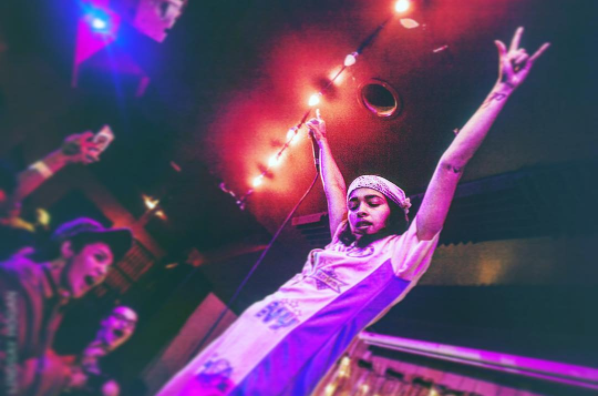
For half an hour this past Friday, the sidewalk outside Songbyrd Music House and Café was a wash of lipstick, denim jackets, top knot buns, and wire rimmed glasses. Women of all shapes, sizes, and colors lined the street, waiting to get their ticket to see Princess Nokia’s (a NYC rapper’s) late show. “It’s so exciting to see this much style in D.C.” the woman behind me commented.
I quickly realized in joining the crowd that this would be a hip-hop performance for more than the average cis male, hip-hop loving audience—a type of show that is becoming more common but is still difficult to find. Upon setting foot in Songbyrd, I could immediately feel the evening’s subtle fem-respecting energy; the mixings of a female DJ welcomed me inside, playing Kendrick’s recent “Humble” followed shortly by Kamaiyah’s “N****s.”
I arrived right before the Maryland-based rock/hip-hop band, G.U.M.P (Give Us More Power), Nokia’s second opener, took the stage. Repeated call-and-responses of the band’s un-abbreviated name roused the 11:30 crowd as the group ripped into their first song “Acorn.” While the band had some seemingly easy lines—“Acorn’s” repeated lyric “they don’t love you like they think they do” brought me back to those angsty middle-school days—the guitar, bass, and drums hit hard, almost demanding the audience to bounce. The band’s explicit anarchy-inducing cheers of “fuck the man, fuck the president” as well as their dedication of a song to “beautiful women of color” made for a great Nokia opener.
G.U.M.P heightened crowd excitement, and at 1 AM, Princess Nokia, clad in a belly-showing Pokémon t-shirt, took the stage. In addition to music from her most recent album 1992, Nokia performed two new songs—which she announced would soon be available through the album’s world-wide redistribution—and closed with the fan-favorite “Young Girls” from her first album Metallic Butterfly. While her music, as always, was fun and provocative (the lines from a new a track “no I ain’t did it/this is your man and/that ain’t my business” brought cheers from the crowd) what was most striking about Nokia’s performance was her dedication to her audience.
Throughout her performance, Nokia emphasized that she would try to stand where everyone, even the people in the back, could see her and explained that she wanted everyone present to “feel special.” At one point, she made eye contact with a woman in the middle of the crowd and told everyone to make room so the woman could come to the front.
Nokia made a point to interact with her audience as much as possible—crowd surfing (despite Songbyrd’s very low basement ceiling), having everyone join hands to pray for DC’s missing girls as well as sex trafficking, and thanking everyone, present men especially, for creating an “accepting space” that evening. Her compliments and “thank yous” were reciprocated with cheers. The Princess loved the audience and the audience loved the Princess.
It wasn’t a perfect night—I still had to move my position in the audience to get away from a man who randomly harangued me with questions about the show, what seemed like a misguided attempt at flirtation—but it felt like a small step in the right direction. For the hour that Nokia performed, the words “bitch” and “ho” seemed fully reclaimed, melanin was unanimously accepted as beautiful, and sexuality was one’s own, not something to be evaluated by others. The sold-out performance made for an empowering evening of music—showing DC that there’s more to the hip-hop community than the often assumed, misogynistic control.
